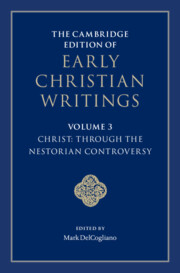Book contents
- The Cambridge Edition of Early Christian Writings
- The Cambridge Edition of Early Christian Writings
- The Cambridge Edition of Early Christian Writings
- Copyright page
- Contents
- Notes on Contributors
- Acknowledgments
- Note on the Texts and Translations
- Abbreviations
- Series Introduction
- Introduction
- Part I The Beginnings of Christology
- Part II Developing Christological Traditions
- Part III Traditions of Pro-Nicene Christology
- Part IV Controversy over Nestorius
- 40 Eusebius of Dorylaeum, Protest
- 41 Cyril of Alexandria, Second Letter to Nestorius
- 42 Nestorius of Constantinople, Second Letter to Cyril
- 43 Proclus of Constantinople, Homily on the Holy Virgin Theotokos
- 44 Nestorius of Constantinople, Three Letters to Celestine of Rome
- 45 John Cassian, On the Incarnation of the Lord against Nestorius 3.1–16 and 5.1–4
- 46 Cyril of Alexandria, Third Letter to Nestorius
- 47 Nestorius of Constantinople, Letter to John of Antioch
- 48 Theodoret of Cyrrhus, Refutation of the Twelve Anathemas of Cyril of Alexandria
- 49 Acts of the Council of Ephesus ( June–October 431): Selected Proceedings
- 50 Cyril of Alexandria, Letter of Reunion to John of Antioch
- 51 Ibas of Edessa, Letter to Mari the Persian
- 52 Cyril of Alexandria, First Letter to Succensus
- 53 Cyril of Alexandria, Second Letter to Succensus
- 54 Theodoret of Cyrrhus, Eranistes: Epilogue
- Suggestions for Further Reading
- Scriptural Index
40 - Eusebius of Dorylaeum, Protest
from Part IV - Controversy over Nestorius
Published online by Cambridge University Press: 05 February 2022
- The Cambridge Edition of Early Christian Writings
- The Cambridge Edition of Early Christian Writings
- The Cambridge Edition of Early Christian Writings
- Copyright page
- Contents
- Notes on Contributors
- Acknowledgments
- Note on the Texts and Translations
- Abbreviations
- Series Introduction
- Introduction
- Part I The Beginnings of Christology
- Part II Developing Christological Traditions
- Part III Traditions of Pro-Nicene Christology
- Part IV Controversy over Nestorius
- 40 Eusebius of Dorylaeum, Protest
- 41 Cyril of Alexandria, Second Letter to Nestorius
- 42 Nestorius of Constantinople, Second Letter to Cyril
- 43 Proclus of Constantinople, Homily on the Holy Virgin Theotokos
- 44 Nestorius of Constantinople, Three Letters to Celestine of Rome
- 45 John Cassian, On the Incarnation of the Lord against Nestorius 3.1–16 and 5.1–4
- 46 Cyril of Alexandria, Third Letter to Nestorius
- 47 Nestorius of Constantinople, Letter to John of Antioch
- 48 Theodoret of Cyrrhus, Refutation of the Twelve Anathemas of Cyril of Alexandria
- 49 Acts of the Council of Ephesus ( June–October 431): Selected Proceedings
- 50 Cyril of Alexandria, Letter of Reunion to John of Antioch
- 51 Ibas of Edessa, Letter to Mari the Persian
- 52 Cyril of Alexandria, First Letter to Succensus
- 53 Cyril of Alexandria, Second Letter to Succensus
- 54 Theodoret of Cyrrhus, Eranistes: Epilogue
- Suggestions for Further Reading
- Scriptural Index
Summary
Eusebius of Dorylaeum was a fifth-century bishop and a prominent theologian. Trained in legal practice, he became a distinguished rhetorician in Constantinople. His significant erudition earned him esteem at the imperial court. While still a layperson, Eusebius became the first person to contest Nestorius, the newly installed archbishop of Constantinople, in order to defend the title Theotokos for the Virgin Mary. When Nestorius challenged the theological propriety of the title, Eusebius confronted him in church. Cyril of Alexandria recounted the incident as follows:
When [Nestorius] used novel and profane expressions in the midst of the church, a very talented and accomplished man, who was still among the laity and had moreover collected for himself an impressive education, was moved with fiery and God-loving zeal and said with a piercing cry, “The Word before the ages also endured a second birth, that which is according to the flesh and from a woman!” In response to this pandemonium broke out among the people. Most of those with intelligence honored the man with immoderate praise as pious, extremely intelligent, and in possession of orthodox doctrines, but others raged against him. Sizing up the situation, he immediately indicated his approval of those whom [Nestorius] had brought ruin upon for teaching what he himself did and sharpened his tongue against the one who was refusing to consent not merely to his teachings but even to the holy fathers who had legislated for us the pious definition of the faith, “which we have as a sure and steadfast anchor of the soul,” according to what has been written.1 “I am delighted,” [Nestorius] said, “to see your zeal. But the refutation of the pollution uttered by this wretched man is self-evident. For if there are two births there must be two sons. But the church knows one Son, the Master Christ.”2
- Type
- Chapter
- Information
- The Cambridge Edition of Early Christian Writings , pp. 559 - 563Publisher: Cambridge University PressPrint publication year: 2022

